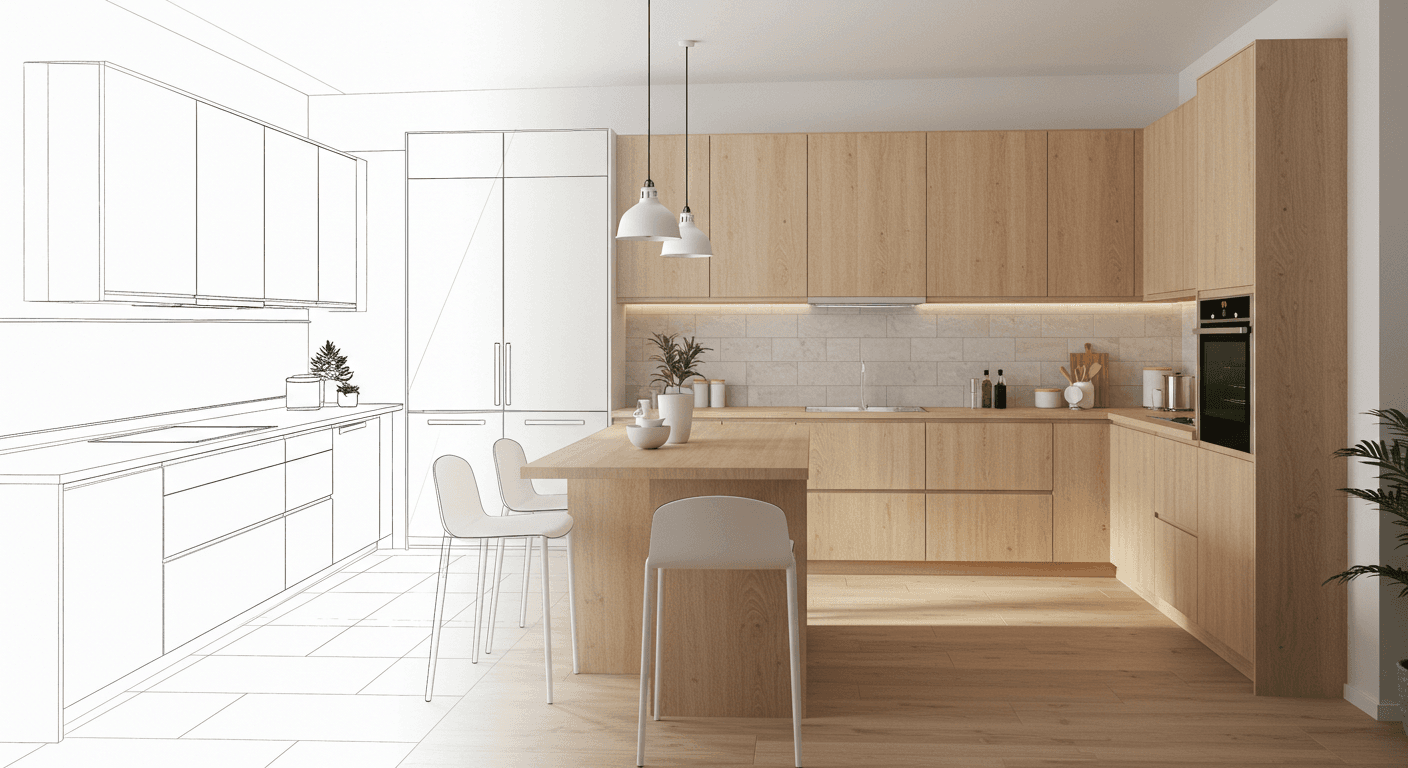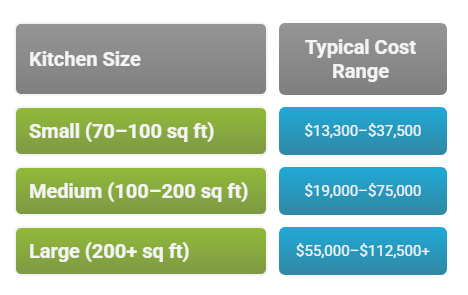How Much Does a Full Kitchen Remodel Cost in Denver?
June 24, 2025
5 minutes read
Remodel Cost

How Much Does a Full Kitchen Remodel Cost in Denver?
Remodel Cost
June 24, 2025
5 minutes read
How Much Does a Full Kitchen Remodel Cost in Denver?
Remodeling a kitchen is one of the most rewarding — and expensive — projects a homeowner can undertake. In Denver, where housing demand and building costs are high, kitchen remodels are particularly popular but come with a wide range of price tags depending on the scope, size, and quality of materials used.
Why Are Kitchen Remodels in Denver Popular (Yet Pricey)?
Denver’s booming real estate market has encouraged homeowners to invest in upgrades that boost both property value and everyday enjoyment. A kitchen remodel not only modernizes your space but can offer one of the highest returns on investment if you sell. However, due to strong demand, high labor costs, and the increasing price of quality materials, Denver kitchen remodels often cost more than the national average.
What You’ll Learn in This Guide
In this detailed breakdown, you'll find:
- A clear overview of remodel costs by budget level
- Key factors that influence your overall price
- Real-world examples from Denver homeowners
- Tips on budgeting wisely for your project
Typical Cost Ranges for a Full Kitchen Remodel
Kitchen remodels in Denver vary widely based on materials, size, and the complexity of work. Here's a breakdown by project scope:
Basic Remodel: $7,000–$10,000
- Cosmetic updates (painting cabinets, new hardware, simple fixture swaps)
- Affordable materials (laminate countertops, vinyl flooring)
- No major layout changes
Mid-Range Remodel: $11,000–$75,000
- Refaced or new cabinets
- Upgraded countertops (quartz, granite)
- New energy-efficient appliances
- Moderate layout modifications
- Upgraded flooring and lighting
High-End/Luxury Remodel: $75,000–$150,000+
- Custom cabinetry and premium finishes
- Top-tier appliances (like Wolf, Sub-Zero)
- Structural changes (e.g., removing walls)
- High-end flooring (hardwood, natural stone)
- Smart home integration and bespoke design details
Quick Note: Each level significantly affects both your final cost and your kitchen's functionality and style, so be honest about your goals when setting your budget.
Cost Per Square Foot for Kitchen Remodels in Denver
In the Denver area, a full kitchen remodel typically costs between $190 and $375 per square foot.
How Square Footage Impacts Your Budget
The larger your kitchen, the more materials, cabinetry, and labor you'll need. This is why square footage is a major cost driver — even small changes in size can add thousands to the total.
National Comparison
Denver remodel costs are generally 15–25% higher than the national average, primarily because of high demand, skilled labor rates, and increasing material costs in the region.
Average Remodel Costs by Kitchen Size

Estimating Based on Your Kitchen Size
- Small kitchens can often be remodeled with a modest budget if you focus on cosmetic upgrades.
- Medium-sized kitchens offer more room for luxury finishes or layout changes but need careful budgeting.
- Large kitchens often involve higher-end materials and professional-grade appliances, pushing costs much higher.
Always measure your space accurately and factor in an extra cushion if you're planning structural changes.
Key Factors That Influence the Cost
Several major elements impact the total cost of a kitchen remodel in Denver:
1. Cabinetry (~29% of total cost)
Custom cabinets can dramatically elevate your kitchen but also dominate your budget. Even semi-custom or stock cabinets come with a significant price tag.
2. Labor (~17% of total cost)
Skilled labor — from carpenters to electricians and plumbers — is costly but crucial. Denver’s strong economy and construction boom have pushed labor rates higher than the national average.
3. Appliances, Countertops, and Flooring
Choices here can swing your budget wildly:
- Appliances range from $500 microwaves to $10,000+ commercial ranges.
- Countertops vary from affordable laminates to luxurious marble and quartzite.
- Flooring options like engineered hardwood, luxury vinyl, or natural stone have vastly different price points.
4. Permits ($200–$2,500)
In Denver, most kitchen remodels require permits, especially if you’re altering plumbing, electrical, or structural elements. Permit costs depend on the project's size and complexity.
Real-World Estimates and Homeowner Experiences
Here's what actual Denver homeowners are reporting for kitchen remodel costs:
- Basic remodels with painted cabinets and new fixtures are averaging around $27,000–$50,000.
- Mid-range remodels with upgraded quartz countertops, new flooring, and semi-custom cabinets typically fall between $50,000–$75,000.
- High-end remodels involving luxury appliances, custom cabinetry, and structural changes can reach $100,000–$300,000 or more.
Reddit and Local Feedback Highlights
- Reddit users in r/Denver and r/Homeowners frequently mention sticker shock at contractor quotes, often $50,000+ for even modest projects.
- Luxury remodels cited by locals often end up closer to $150,000–$200,000 once smart tech and high-end appliances are factored in.
Tips for Managing Costs During Your Kitchen Remodel
Managing a kitchen remodel budget is an art. Here’s how to keep your project financially sane:
- Set a realistic budget — and add 10–20% for surprises.
- Prioritize must-haves over nice-to-haves.
- Mix materials — splurge on key focal points, save elsewhere.
- Reuse or reface existing cabinetry if possible.
- Get multiple quotes — don’t settle for the first bid.
- Plan for permits and inspections upfront to avoid delays.
Conclusion: Planning Your Dream Kitchen in Denver
A full kitchen remodel in Denver can be a major investment — but with smart planning and budgeting, it's one that pays off in daily joy and increased home value. By understanding the true cost ranges, key cost drivers, and real-world examples, you can confidently move forward with your project and create a kitchen you’ll love for years to come.
Ready to start planning your dream kitchen? Denver’s top contractors and designers can help you bring your vision to life — beautifully and within budget.Frequently Asked Questions
1. How long does a full kitchen remodel take in Denver? Most full kitchen remodels in Denver take between 6 to 12 weeks, depending on the complexity of the project, availability of materials, and whether structural changes are involved.
2. Do I need a permit for a kitchen remodel in Denver? Yes — most kitchen remodels require permits, especially if you’re moving plumbing, electrical, or making structural changes. Permit costs typically range from $200 to $2,500.
3. Can I save money by keeping my existing kitchen layout? Absolutely. Maintaining the current layout can significantly reduce costs by avoiding expensive plumbing and electrical rerouting, which can add thousands to a project.
4. Is it cheaper to reface or replace kitchen cabinets? Refacing cabinets (updating the doors and hardware) is generally much cheaper — often half the cost of full replacement — and a good option if your cabinet boxes are still in good shape.
5. How do Denver kitchen remodel costs compare to the national average? Denver remodel costs tend to be slightly higher than the national average, mainly due to strong demand, a competitive contractor market, and rising material costs.